Blue Aeroplanes - Interview
by Richard Lewis
published: 8 / 2 / 2017
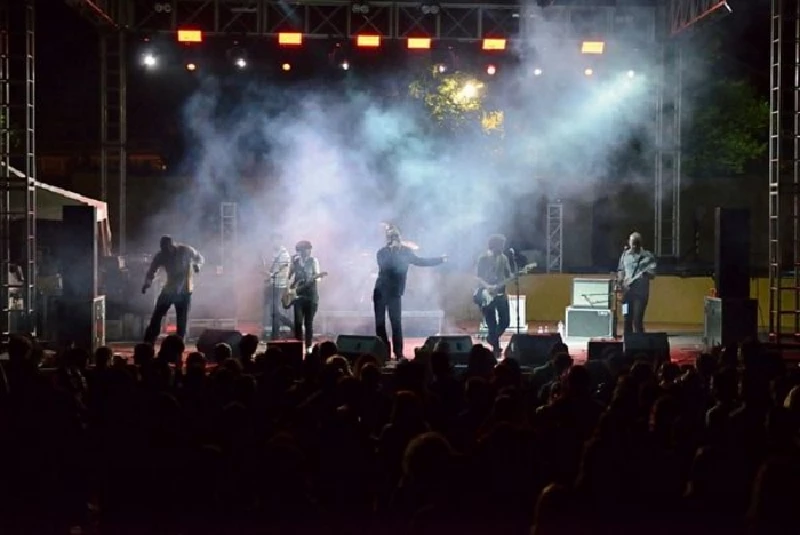
intro
With fourteenth studio album ‘Welcome Stranger!’ set for release in January along with an extensive UK tour, Gerard Langley, the leader of Bristol art-rock outfit the Blue Aeroplanes, chats to Richard Lewis about the making of the new LP
One of the finest art rock bands to have come out of these Isles, the Blue Aeroplanes have been stalwarts of the British independent music scene since their 1984 debut album 'Bop Art'. Maintaining a cult audience while making forays into the mainstream, the Bristolians have frequently been compared to Transatlantic contemporaries R.E.M., a group who readily acknowledged their influence as have Radiohead. Starting out in the post-punk era, the band swerved around orthodoxy from the outset, introducing acoustic instruments, folk harmonies, off kilter tempos and possessed a stage show that bordered on unhinged due its kinetic energy. At the controls throughout the years has been enigmatic permanent shades-wearing poet/singer Gerard Langley, whose sung-spoken vocals and superlative wordplay has been the band’s hallmark since their inception. Following their 2011 LP ‘Anti-Gravity’ which was buoyed by the warm reception that greeted the reissue of their classic 1990 LP ‘Swagger’, the group have been experiencing a steady rise in their profile. Not that they ever went away of course, but, as the title of excellent new LP ‘Welcome Stranger!’ hints at, newcomers to the group or returning fans will be delighted at how strong the new set is. A concise ten song blast, the disc states the band's founding principles in formidable style and sounds like the work of newcomers, not an outfit on their fourteenth long player. Elsewhere the Blue Aeroplanes have had a recent resurgence in their live profile following a personal invite to play the All Tomorrow’s Parties Festival this April from guest curator Stewart Lee. Joining Gerard in the cockpit are founder members brother John on drums, along with dancer Wojtek Dmochwski plus former Witness front man Gerard Starkie, bassist/co-owner of The Fleece venue in Bristol Chris Sharp, lead singer of I Destroy guitarist Bec Jeavons and guitarist Mike Youe. A group whose revolving door membership stretches towards fifty has been in place for half a decade. "It’s coming up to five years now. It’s really good," Gerard explains over the phone from his home in Bristol. "Although we’ve done a few tours, what we mainly did was write this album. It’s been really good because it’s been like it was when it started out. It started out amongst people I just knew anyway. I found myself in a line-up with musicians I’d known for ages. We’d come together to do a tour off an album and then when that was over I was thinking we need to write some new stuff and I couldn’t imagine sitting in a room with these people I never saw outside of rehearsal rooms. I just got together with Bec and Mike. It might have been for a solo thing but literally after a two or three weeks we’d written half the stuff that’s on the album. So I thought this is going to be the line-up then." While the gap between ‘Welcome Stranger!’ and its predecessor has been six years, the band members have been busy in the interim. "It’s probably the longest gap without anything coming out, yeah," the vocalist affirms. "Partly because we’ve been setting up The Fleece (the group played an essential role in reviving the Bristol venue) and also I’m the Head of Songwriting at Bristol BIMM (British Institute of Modern Music) which is taking up quite a lot of time." One of Gerard’s recent charges at BIMM was singer-songwriter George Ezra, who scored a worldwide hit with his single ‘Budapest’ and went on to release million plus selling debut LP ‘Wanted On Voyage’ in 2014. "George is good. He actually wrote one of the songs on the album and on one of the EPs while he was still a student there. He was only 18. He’s not only talented but he’s very together," Gerard recalls. "I used to talk to him a lot not just about songs but about how you deal with people at labels and that sort of stuff. It was a two and a half year campaign. They sent him out doing a lot of gigging solo. They gave him a Euro Rail Card and said ‘Go out and have some adventures and write about them.’" Switching focus to ‘Welcome Stranger!’ the self-produced album announces the Blue Aeroplanes' re-emergence in upfront style. Bursting from the speakers with the live urgency they made their name with and the songcraft that earned ‘Swagger’ and ‘Beatsongs’ (1991) such plaudits the album fizzes with energy. "What we did was we went to a really good studio called Vale in Evesham, I think Anna Calvi’s been in there, people like that," Gerard explains. "It’s one of those residential ones where you stay and have your food and what have you and you concentrate on making the record. I’ve done that before with major labels but usually it’s a couple of months. I thought it would be nice for Bec and Mike to have some of that kind of atmosphere but we just did it really quickly because we just rehearsed the hell out of everything and did two to three tops of live takes. You can get the same quality but do it much quicker." Heralded by excellent lead single ‘Elvis Festival’, the punchiness of the album can be partly attributed to studio engineer TJ Allen, a live member of Bat For Lashes. "He’s worked with loads of other people like (legendary producer) Youth. He’s one of the country’s top level, rising engineers. If people want a shit-hot engineer, he’s one of the people they’ll get in," the frontman enthuses. "We arranged and produced the LP ourselves with TJ recording it. On the production side, having strings on one track (album highlight ‘Nothing Will Ever Happen in the Future’) and all that sort of stuff, that’s more our bag but sound was very much TJ’s." The tapestry of guitar sounds on the LP, an integral element of the group’s sound is captured to iridescent effect. "It’s partly because Bec and Mike locked in really quickly," Gerard notes. "Gerard Starkie wasn’t in the band to start with. He had been but not been on the scene for a bit. When Cherry Red reissued ‘Beatsongs’ (in 2013) you’ve got to have three guitars to play those parts, so we got him back in and then Bec and Mike really liked him so he’s back being a permanent member. The three of them lock in really well. The thing about three guitars is no-one has to play too much, the parts have to fit and that’s what we managed to do. It worked from the start with me, Bec and Mike, getting the parts to fit without being over the top." "There’s only two short solos on the whole record. I wanted to get away from the verse, chorus, verse, chorus and then a solo thing. It seemed a bit old. We’d done that," the singer says of the guitar interplay in the disc."There’s a little one at the end of the first song and then on ‘Nothing Will Ever Happen in the Future’ we got Nick Jacobs from the first line-up (1981-88) in to do a really quirky little solo in the middle. He’s an art school boy, and he kind of invented his own way of playing, which was big feature in the early Aeroplanes. Mike who’s a bit student of guitar was saying that the way his fingers hit the strings seems to be completely unique. He’s influenced mainly by Syd Barrett, Dave Davies, the Gang of Four, reggae and African music." Keeping things centred around the River Severn meanwhile, the group called upon another associate to supply strings for the LP. "There’s a guy called Adam Coombs who played piano when I toured ‘Record Player’ (2001 LP) who’s a noted arranger around town in Bristol. He does a lot of orchestration. He did the arrangements on that, and got in real cellos and violins. On the whole album we decided not to have that many extra musicians, so mostly we play. Adam plays a bit of organ. There’s a guy named Ed Taylor who was in a band with Bec who’s got a band called Kamino now who does a few of the harmonies. He’s got perfect pitch." Talking of which, the new LP is awash with harmonies, the voices providing another instrument in the mix. "We decided with Bec -she leads her own band called I Destroy - we thought ‘Right we’re gonna concentrate on that,’" Gerard says of the focus on vocals. "Bec and Ed have always worked together. We actually worked out that most rock harmonies are done a certain way in third, fifths, sevenths and we made an effort to use some slightly different ones. A lot of the ones I like apparently are in is in fourths and have shifting tones with one harmonies going on and one harmony shifts within it. We used bits of that." "It was a deliberate thing to use harmonies on there. I got together with Ed and made a CD with lots of harmonies I like and he was saying you’ve picked things that aren’t doing thirds, fifths and sevenths basically! Things like (late 1960s US psych outfit) Kaleidoscope, they had a Turkish guy (Solomon Feldthouse) in there. They were an amazing band. Dave Lindley who was in them still plays for Ry Cooder. I used them as a reference point and very early Lindisfarne, ‘Clear White Light’ and that sort of stuff where they had massive harmonies," Gerard explains. "Some of the folkies too like Robin and Barry Dransfield, I like the fact that brothers and relatives sing certain ways, because they’re so attuned to each other." "We had twin sisters in the band once (Tracey and Vivian Bowen), playing rhythm guitar and bass for a while," the singer recalls. "They made an album of their own, The Radon Daughters. They’re broad Lincolnshire. They live in Spain now. I tried once to get them to sing the same line, like that Appalachian thing where you sing in unison and they actually couldn’t do it. They automatically harmonize. They really struggled to sing the same melody at the same time. They couldn’t do it! If you get someone who’s got a good instinct or likes a lot of different stuff and people who actually know the technical side, you can actually work things out which is pretty cool." An entrée between ‘Nothing…’ and ‘Skin’ meanwhile is a curious untitled sliver of a song. "We had the chorus, then I had the idea for a little round thing. There’s about ten minutes of that, literally just wandering round in the studio, Gerald Starkie playing an acoustic guitar and it’s about five people just singing. We had a whole section of it and I just stuck it on the end as a bridge between that and 'Skin'. Gerard takes a backseat to allow Bec and Mike to take the mike. Bec, then Mike’s doing the main harmonies and chorus and Ed’s doing the really high one at the end. He’s got a massive range. When you get that one at the end it’s quite climatic." Elsewhere on the LP an idiosyncratic cover of 1999 chart topping dance track ‘Sweet Like Chocolate’ is overhauled to sound akin to ‘Life Rich Pageant’- era R.E.M. all twisting guitar riffs and rich harmonies. "I changed the words a little bit. The tune is now the guitar part. The intro is exactly the same. They played it on synths. When I heard it I thought if you played that on guitars it would sound like King Crimson, that stop-start, odd-time thing. It’s harder to play on the guitar than the original synth, but it’s pretty much the same part. That’s what everyone says!" Gerard laughs when it is pointed out it doesn’t sound like a cover. "We kind of made it our own, I think." This along with the ringing guitar lines throughout the LP showcase the dexterity of three axe slingers in the band at present. "There’s some tricky bits of playing on the album," Gerard states. "There’s a song called 'Poetland' at the end. There’s quite a fiddly part that Mike wrote and Bec plays. Then there’s one point where they’re doing an ascending bit and playing together in complete unison. It sounds like double tracking, but it’s not. That’s the two of them playing it and that’s pretty finger busting. They’re both really good guitarists. I think it’s because we wrote all those sort of things that the guitar parts are pretty hooky. I thought, 'Well, I’m not going to do this in the way that I’ve been recording, I’m going to make this sound like a major label album.’" "We got the vinyl test pressings back and they sound really good as well." On the subject of which the present band issued the LP of their previous album before the CD and the download. "Yeah, and it pissed everybody off!" Gerard retorts. "There’s an independent Aeroplanes chatroom site which has been going for years and there’s still people who are pissed off at me on there. I was threatening to put this one out on cassette only but we didn’t quite get it together!" he laughs. With the album release imminent, a collection of Gerard’s lyrics and poems drawn from the Aeroplanes’ output and beyond is nearing publication. "I’m just finishing it off at the moment," he states. "Obviously with doing something called ‘Selected’, you kind of vary from week to week as to whether you think they (the pieces) should be in there or not. I think I’ve got it about right now. It should be around for the Christmas gig in Bristol (the ‘Planes’ annual bunfight at The Fleece). We’ve been asked to do a Pledge (Music) thing next year which I’m still thinking about. We might do editions for that." "A lot of them aren’t written as lyrics as such. They’re written as poems," Gerard says of the writing process. "I used to have a quite strict division between poems and lyrics, not that it would be apparent to anyone else, but to me poems are the ones I’d written first and finished then waited until there was the right piece of music for it. Lyrics are the ones where I maybe had some of it then finished it to a specific piece of music. I think I picked the ones I definitely knew were written as page poems because it’s a book. It’s the thing with Dylan. When he got the Nobel Prize there was loads of stuff about ‘Are songs literature?’ and all that kind of shit," Gerard ruminates. "If you write something such as ‘Like a Rolling Stone’, which was distilled down from a longer page piece before he even put it to music so the verses on that read as page piece because how it was written whereas the chorus where he goes ‘How does it feel?’ you’ve got to hear him sing that. So the choruses are a song and the verses are a poem." "People get really kind of het up about this shit," Gerard says of the (uncalled for) controversy over Dylan winning the literary prize. "You can take a poem and put a tune to it, but some of Dylan’s ones, he doesn’t really sing 'Subterranean Homesick Blues', does he? But just the fact you’ve put a tune to something doesn’t then make it a song lyric. WH Auden he wrote (1938 poem) ‘Miss Gee’, but that was written as a song lyric for a cabaret singer called Hedley Anderson. It was meant to be sung and no one bothers about that!" he laughs. "(Belfast born poet) Louis MacNeice wrote a lot of poems directly influenced by traditional Irish songs or even Cowboy songs. He has got one called ‘The Streets of Laredo’ which is based on a country song. It’s like a Venn diagram. At one end you’ve got things which are purely songs and at one end that are purely poems, and this sort of bit in the middle where it’s all confused." While the debate over lyrics/poems/literature continues, new artists have recently moved into the sector Gerard cites where songs and poems overlap. "There’s more people working in that territory now. For quite a long time I was sort of the only person doing it really to any great length. I always did wonder why that was. I couldn’t quite work it out actually! You’ve got Kate Tempest, George the Poet. I’d include someone like Courtney Barnett as well. ‘Pedestrian at Best’ is well within that kind of range," the singer enthuses. "A lot of people do it now (mixing music, spoken word and poetry) which is one of the reasons why this album isn’t going to sound quite as weird to people. It now fits into a kind of scene of people doing the same thing. Before the approach was kind of on its own, but it’s not now. It always surprised me, people would do the odd track. The first Tindersticks single ‘Marbles’ is like that. There’s a few things like (UK/German indie rockers) Art Brut, but no-one really did it in the same way. Nowadays people sort of are, which I like." "I’d say my favourite contemporary writer in terms of songwriting is Ezra Furman. The current album (‘Perpetual Motion People’) is good, but the one that came out before it on the Bar None label, ‘Day of the Dog’ (2014) is probably my favourite album of the last five or six years. He’s also a really good lyric writer. He does nice little surprising things with his tunes." For literary inspiration meanwhile hunting through the bargain bins has recently been fruitful for the vocalist. "There’s a bookshop in Bristol called The Last Bookshop and it sells new remaindered stuff at £3, and they got a lot of the Faber stuff in, so I’ve been buying a load of stuff and just skimming it." "People have always said when I say ‘I like that band’, ‘How can you like that band? They’ve got shit lyrics?’" Gerard says, expounding on influences and the importance of song lyrics. "I don’t really listen to rock music specifically for the lyrics. If I did I’d have a very small record collection! The lyrics in rock music are designed to float up out of the music and have certain lines that hit you. If you then want to look at the lyric sheet and decide ‘That’s really good’, ‘That’s just OK’, or ‘I’m not going to read that again’, it doesn’t really matter to the success of an album very often. Rock music is only partly about the lyrics to be honest. It’s about atmosphere and playing and tone and vocals and having a great riff. I mean how good are Marc Bolan’s lyrics? As long as lines like "Hubcap diamond star halo" (from ‘Get It On’) float up out of the riff you’re alright, you don’t have to listen to the rest of it’. Establishing themselves with frenetic live shows that have become the stuff of near legend, Manic Street Preachers lead singer/guitarist James Dean Bradfield cited the Blue Aeroplanes 1986 LP 'Tolerance' as one of his favourites after seeing the band live that year. "It was mainly because we did one of the early WOMADs when it was in Reading and we were pretty full-on manic at the time," Gerard explains. "Because Nick (Jacobs) was not only art school but his biggest stage influence was Wilko Johnson, so he’d do a lot of that stuff, and we did used to collide, fall over, go into the audience. In the right sort of club it could be quite threatening! (Laughs). But that’s what they (the Manics) were saying. That was the time of shoegaze and we said deliberately from the start ‘Well, we’re not doing that.’ I’d had a band before called the Art Objects and from the start of the Aeroplanes we said, ‘We’re not a Bristol band. We’re going to do loads of stuff in London.' So you’d end up being third support at the Rock Garden and you’d get no soundcheck, so we just thought ‘Fuck that! We don’t care if we’re out of tune. We’re just going to run around a lot! Doesn’t matter if you can’t hear yourself, I’ll just shout and everyone just go manic! That’s kind of how we started out and the Manics just came out of there saying ‘We’re not going to stand still on stage. We’re going to do that.’" With dancer Wojtek practically creating a one-man moshpit in the studio, as the group tear through ‘Arriving’, the Blue Aeroplanes’ 1986 appearance on BBC2's flagship music show 'The Whistle Test' showcases the Bristolians at the apogee of their bonkers onstage energy. "He was a cool guy, Nick," Gerard recalls of the band’s guitarist. "He never used to cut the strings at the end of his guitar. He’d whip you because he’d be doing all these moves and Wojtek always had his shirt off. It got to the point where we said (exasperated) ‘Cut those strings’. He came to the next rehearsal and he opened the guitar case and he hadn’t cut the strings. We were taking a deep breath when he held his hands up and he’d got this paper bag and he’d been to this joke shop and found these little plastic flies. He just fitted the flies on to the end of the strings, so A. they didn’t whip you and B. it looked like he had a cloud of flies buzzing round the end of his guitar! He used to wear an old ladies’ pillbox hat with a veil on stage. It was pretty rocking." While time may have understandably mellowed the Aeroplanes’ riotous stage presence somewhat, the group are as acclaimed a live draw as ever, as recent showings at the BBC6 Music Festival and the aforementioned ATP appearance have proven. "It’s really good live as well now," Gerard enthuses about the upcoming tour to plug the new LP. "Bec’s got her own little fan club to the side of the stage now. It’s going to be fun." Indeed it will. Welcome those already converted and Welcome Stranger(s). ‘Welcome Stranger!’ is available from Art Star Records on January 6th 2017 The Blue Aeroplanes tour the UK from January 11th 2017 onwards
Band Links:-
http://www.theblueaeroplanes.com/https://en-gb.facebook.com/theblueaeroplanes/
https://twitter.com/blue_aeroplanes/status/776038961919696896
Have a Listen:-
Picture Gallery:-
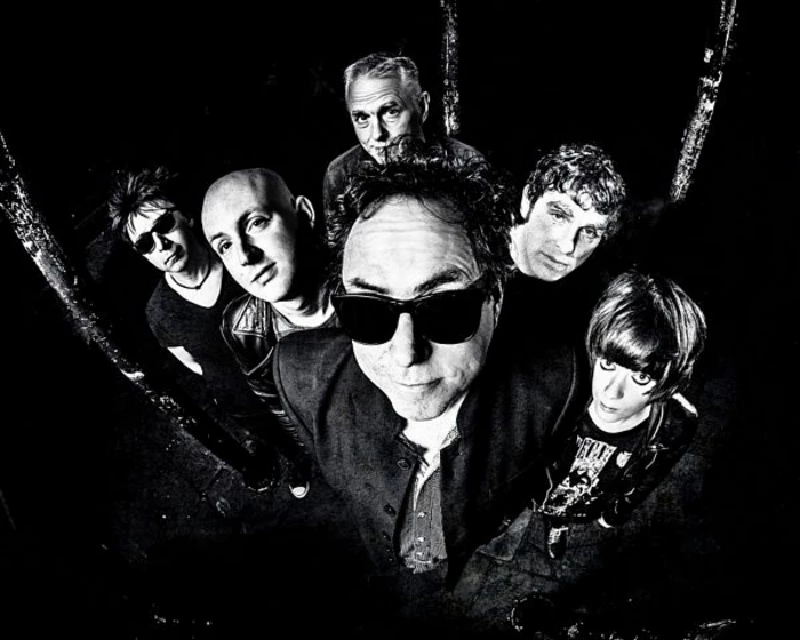
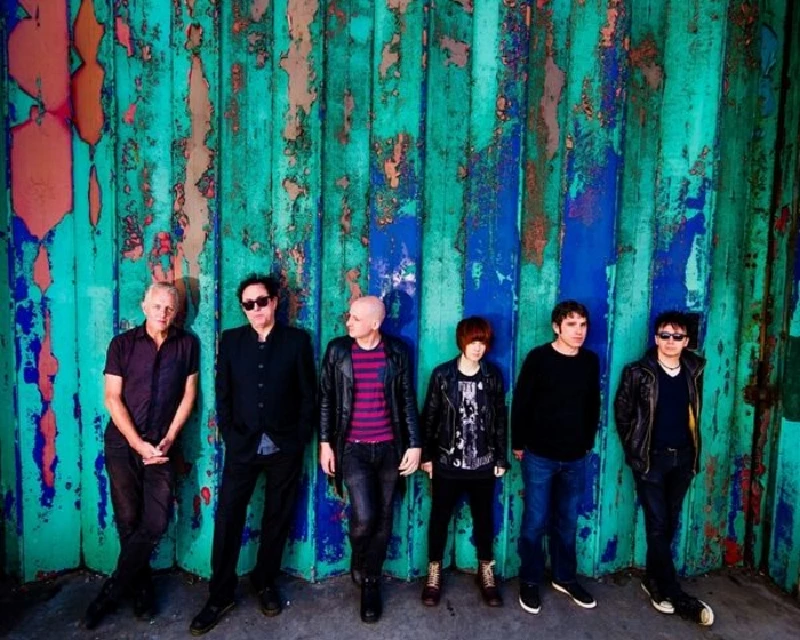
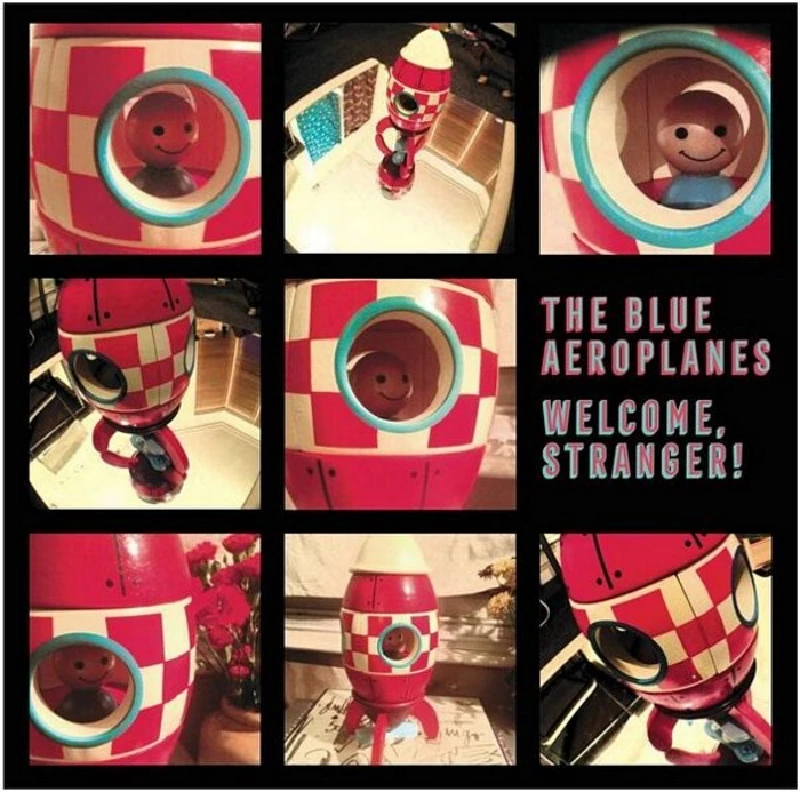
interviews |
|
Interview (2021) |
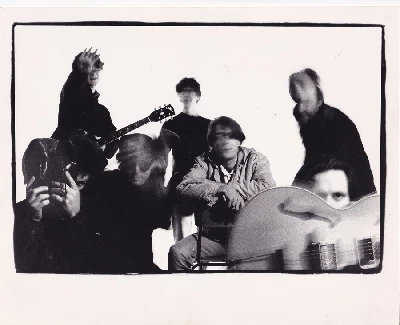
|
| Thirty years ago this month, The Blue Aeroplanes released ‘Beatsongs’, the Bristolian art-rockers' biggest critical and commercial success. But, as frontman Gerard Langley told Nat Mumford, only a twist of fate stopped it from being much bigger... |
| Interview (2011) |
live reviews |
|
O2 Academy, Liverpool, 11/1/2017 |
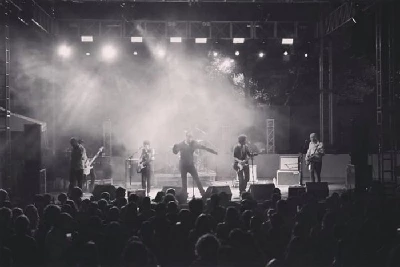
|
| Richard Lewis reviews Bristolian art rock stalwarts the Blue Aeroplanes' highly impressive return to the stage on the opening night of their first UK tour in years |
reviews |
|
Anti Gravity (2011) |
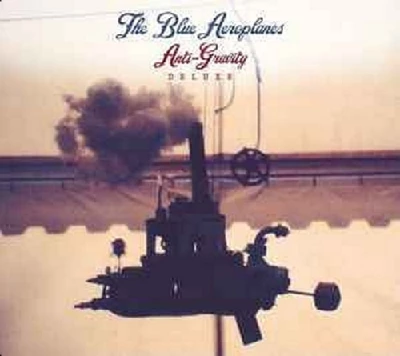
|
| Contemporary-sounding melange of folk, rock and spoken word narrative on initially vinyl only latest album from literate Bristol art rockers the Blue Aeroplanes, who are now approaching their thirtieth anniversary |
| China Brilliance Automotive (2010) |
most viewed articles
current edition
Carl Ewens - David Bowie 1964 to 1982 On Track: Every Album, Every SongArmory Show - Interview with Richard Jobson
John McKay - Interview
Colin Blunstone - Thalia Hall, Chicago, 16/7/2025
Bathers - Photoscapes 1
Billie Eilish - O2 Arena, London, 10/7/2025
Loft - Interview
Visor Fest - Valencia, Spain, 26/9/2025...27/9/2025
Sir Tim Rice - Interview
Robert Forster - Interview
previous editions
Manic Street Preachers - (Gig of a Lifetime) Millennium Stadium, Cardiff, December 1999Heavenly - P.U.N.K. Girl EP
Beautiful South - Ten Songs That Made Me Love...
Peter Perrett - In Dreams Begin Responsibilities Interview Part One
Boomtown Rats - Ten Songs That Made Me Love....
Oasis - Oasis, Earl's Court, London, 1995
Coldplay - Wembley Arena. London, 16/8/2022
Prolapse - Interview
Trudie Myerscough-Harris - Interview
Pixies - Ten Songs That Made Me Love...
most viewed reviews
current edition
Davey Woodward - Mumbo in the JumboSick Man of Europe - The Sick Man of Europe
Lucy Spraggan - Other Sides of the Moon
Amy Macdonald - Is This What You've Been Waiting For?
Suzanne Vega - Flying With Angels
Blueboy - 2
Bush - I Beat Loneliness
Phew, Erika Kobayashi,, Dieter Moebius - Radium Girls
Alice Cooper - The Revenge of Alice Cooper
Cynthia Erivo - I Forgive You
Pennyblackmusic Regular Contributors
Adrian Janes
Amanda J. Window
Andrew Twambley
Anthony Dhanendran
Benjamin Howarth
Cila Warncke
Daniel Cressey
Darren Aston
Dastardly
Dave Goodwin
Denzil Watson
Dominic B. Simpson
Eoghan Lyng
Fiona Hutchings
Harry Sherriff
Helen Tipping
Jamie Rowland
John Clarkson
Julie Cruickshank
Kimberly Bright
Lisa Torem
Maarten Schiethart